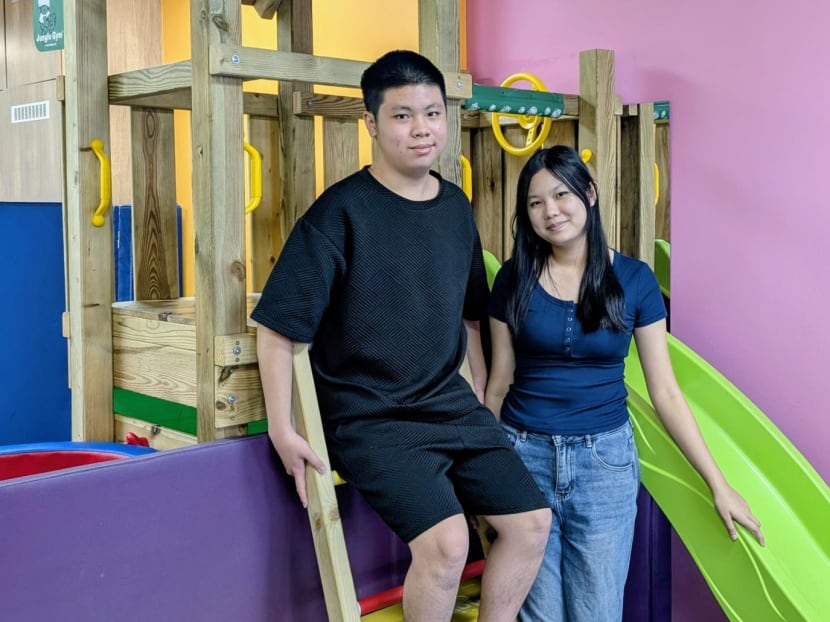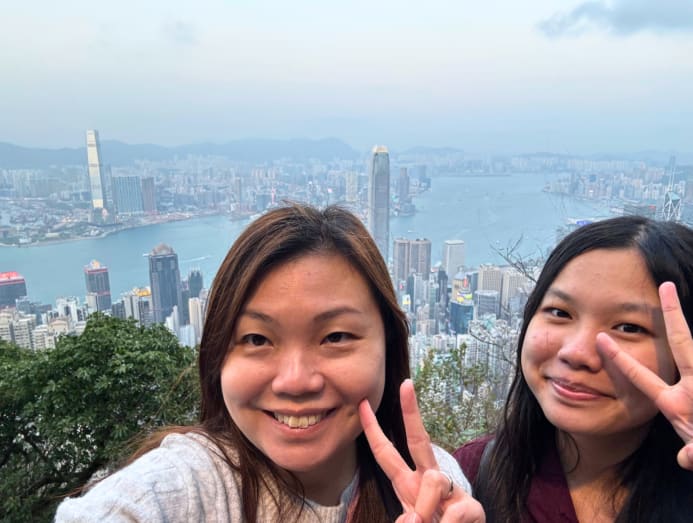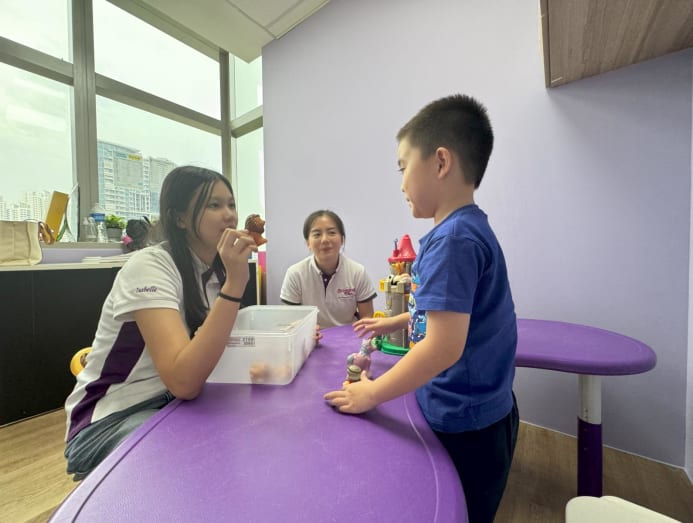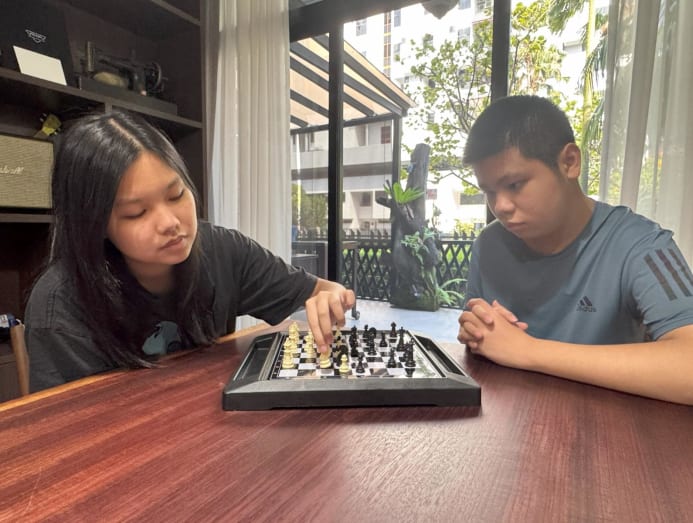I've always been my brother's caretaker. Now I'm learning to be his friend
As a child, Ms Isabelle Lee felt resentful about having to care for her younger brother due to his disabilities. She shares why she is now pursuing a career path in special-needs education.

Ms Isabelle Lee (right) learnt to grow closer to her brother Emmanuel (left) who has special needs. (Photo: Isabelle Lee)

This audio is generated by an AI tool.
I first came across the term "glass child" in 2023, when it went viral on TikTok. It describes siblings of children with disabilities who are often seen through or overlooked because the attention is focused on their brother or sister.
And it hit me. That was me.
My younger brother Emmanuel was born prematurely and diagnosed with global developmental delay, apraxia of speech (a motor speech disorder), attention deficit hyperactivity disorder (ADHD) and dyspraxia, also known as developmental co-ordination disorder.
Much of my early life revolved around his many developmental struggles: therapies, appointments, meltdowns and milestones.
I learnt to adapt quickly, often helping him with his meals, supervising his homework, playing with him and stepping in whenever he became overwhelmed or overstimulated.
I was never explicitly asked to do these things. It was simply understood. I had to be the reliable one.
I remember one incident clearly.
I was around seven years old, doing my homework at home, while Emmanuel, aged four, was playing nearby. He accidentally swallowed a few pieces of my grandmother's bead necklace and ended up vomiting, spewing forth the necklace beads in front of her.
She scolded me harshly for not watching him closely enough. I don't remember her exact words, but the feeling stayed with me – a deep sense of shame and guilt.
From that day on, I began to believe that any mistake he made or any mishap he suffered was my fault, and I carried that responsibility silently for the next several years.
AN UNEXPECTED OUTBURST
As I grew older, I only bottled up more and more of my fears and frustrations. There were days when I wanted to speak up about how I felt, but I kept quiet. I saw how hard my parents were working and I didn't want to add to their already heavy load.
Mum and Dad had left their careers to co-found Bridging the Gap, an early intervention centre for children like Emmanuel. With both of them working long hours, most of the day-to-day caregiving for him fell to my grandmother and me.
By the time I was 10, I started getting angry a lot, often without knowing why.
I began to feel resentful that my needs always seemed to come second to Emmanuel's – like I didn't matter.
I felt like I was under constant pressure to be perfect all the time, just to avoid being yet another burden. Looking back, it was a lot for a young child to bear.
One day, after a minor disagreement, I yelled at my mum – something I had never done before. Mum was taken aback. To her, I was always the quiet, well-behaved child.
Thankfully, I think she saw through the outburst to the real cause.
She began setting aside more intentional time just for me. We started going for weekly mother-daughter dates for a nice meal or dessert at my favourite spots – Fu Lin Tofu Yuen in Siglap or Swensen's at Parkway Parade – just the two of us.
We laughed, talked and enjoyed each other's company without having to think about my brother.
As I got older, we even started taking overseas girls-only trips. Most recently, we went to Hong Kong earlier this year.
I started to feel seen and heard.

A REAL SIBLING BOND
During my teenage years, I started volunteering at Bridging the Gap. I met other siblings who lacked the same support I used to lack, who struggled to express themselves the way I did.
I've realised that while I had my own emotional wounds, I was still incredibly privileged.
With both parents working in special needs and early childhood education, I had access to resources, language and support systems that most people in the same boat may never have.
What also helped me to heal was growing closer to my brother – not just as a caretaker or guardian, but as a true sibling.
We started baking together when I was around 11 or 12. We love cupcakes and over the years, we have experimented with all kinds of flavours: blueberry, strawberry, lemon and, our favourite, chocolate chip.
In the kitchen, Emmanuel is always so eager to try new things, whether it is cracking eggs, mixing the batter or carefully arranging cupcake liners. Even when he doesn't get it quite right, he approaches every task with excitement and a fearless curiosity.
He's never afraid to make a mess or try again, and he has taught me so much about embracing the process instead of just focusing on the outcome.

We started playing badminton together around the same time, at the common court in our estate.
Initially, he struggled with coordination and frequently missed the shuttlecock. I could see he was frustrated, but he never gave up. Over the years, he has improved so much that he now wins rounds against me.
Watching him grow, both in the kitchen and on the court, has taught me so much about being resilient and finding joy in the little things.
Bonding with him in these ways has helped me see him not just as someone I need to care for, but as someone I admire deeply.
These days, my brother has even started teaching me things instead. Earlier this year, he taught me to play chess and we now play together during my free time. It has become our quiet way of connecting, a moment in the day when the two of us get to bond as siblings without distractions.
He takes chess pretty seriously. When we play, he is focused, strategic and often a few steps ahead of me. Honestly, he wins more than I do.
But what I love most is his kindness. When I make a mistake, he doesn't gloat or get impatient. Instead, he gently lets me try again.
In those moments, I feel like I can see my brother at his core – thoughtful, patient and generous in his own way.

SEEING GLASS CHILDREN AS THEY ARE
Today, I'm 19 and preparing to begin a degree in speech and language therapy at the Singapore Institute of Technology.
I still volunteer at Bridging the Gap, where I shadow speech therapists and assist children with speech or developmental delays. It's not just my way of giving back – it's also my way of healing my own past wounds.
When people talk about families of children with special needs, the spotlight often shines on the parents or the child with the diagnosis.
But I hope that more people will recognise that siblings of children with special needs need support, too. Not every glass child has the space or the words to name what they're feeling, or the tools to help them unpack it, even if it is just the listening ear of a loved one.
We are often the ones quietly observing, helping, adjusting – doing our best not to add to the weight our families already carry. But silence doesn't mean we're unaffected.
Many of us grow up feeling unseen, as if our needs matter less simply because we appear "fine".
Our burdens may be invisible but they can still be heavy: guilt, confusion, loneliness, and a deep longing to be acknowledged.
We may not struggle with the same things our special-needs siblings do, but glass children are like any children. We need to feel seen and heard, to be reminded that our perspective and experiences matter.
If you are a glass child like me, I want you to know: your feelings are valid. It is okay to feel conflicted – to love your sibling deeply, yet also feel hurt or unseen.
It does not make you a bad sibling or a bad person; it makes you human.
Isabelle Lee is an aspiring speech-language therapist studying at the Singapore Institute of Technology. She volunteers at Bridging the Gap, advocating for sibling support and raising awareness of the experiences of glass children.
If you have an experience to share or know someone who wishes to contribute to this series, write to voices [at] mediacorp.com.sg (voices[at]mediacorp[dot]com[dot]sg) with your full name, address and phone number.










